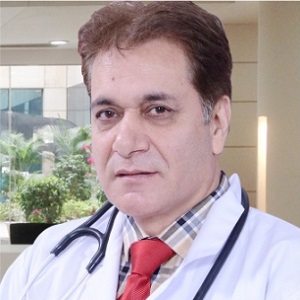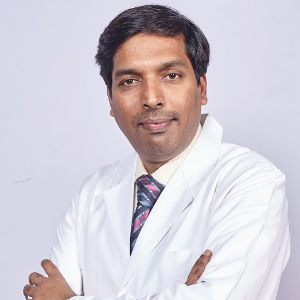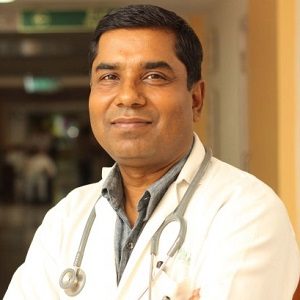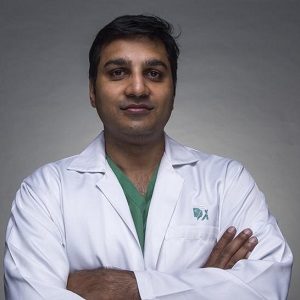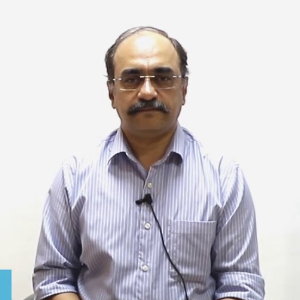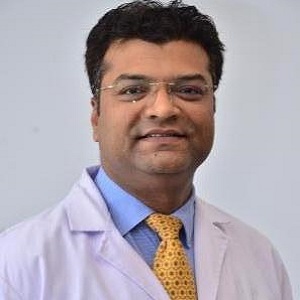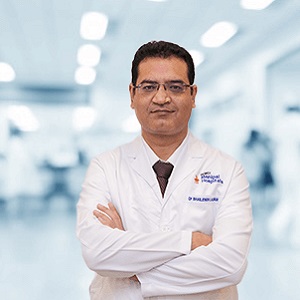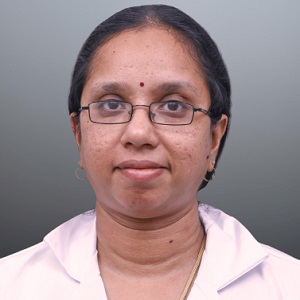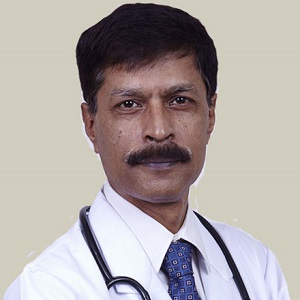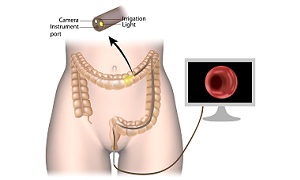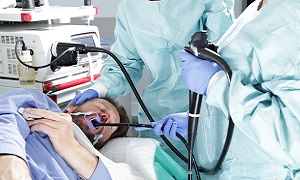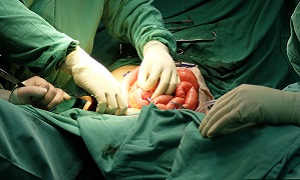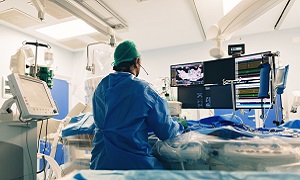Best Doctors in India for Carcinoid Tumors Treatment
- Gastroenterologist, Gurugram, India
- Over 17 years’ experience
Profile Highlights:
- Dr. M A Mir is a well-known Gastroenterologist and Endoscopist with a vast experience of more than 17 years in the field of Gastroenterology.
- Before joining Artemis Hospital he was associated with Pushpawati Singhania Research Institute for Liver and Digestive Diseases, New Delhi as a Consultant Gastroenterologist and Endoscopist.
- He is experienced in all gastrointestinal procedures such as diagnostic and therapeutic upper and lower GI endoscopies.
- Liver Transplant & HPB Surgeon, Gurugram, India
- Over 20 years’ experience
Profile Highlights:
- Dr. Ajitabh Srivastava is a reputed HPB and Liver Transplant surgeon in India.
- He has been a key member of teams that performed over 1500 liver transplants including living donors, deceased donors, pediatric transplants, and combined liver and kidney transplants.
- He is an expert in other complex procedures involving hepatobiliary surgery, combined liver, and Kidney Transplant, and vascular access surgery.
- Gastroenterologist & Hepatologist, New Delhi, India
- Over 30 years experience
Profile Highlights:
- Dr. Amitabha Dutta is a renowned Gastroenterologist and Hepatologist with 10 years of experience as a specialist. He has more than 30 years of professional experience in gastroenterology and general medicine.
- After practicing for 10 years in the UK, Dr. Dutta relocated to India and joined Apollo Hospitals in 1995. He was the one to set up the Gastroenterology department at Apollo Hospital, and he continues to work as a senior consultant in the Department of Gastroenterology and Hepatology at Indraprastha Apollo Hospital.
- Dr. Amitabha Dutta offers non-surgical treatment for various issues ranging from piles, skin tags, and acidity to Ulcerative Colitis and the current Coronavirus outbreak.
- He got MRCP certification from The Royal College of Physicians Of Ireland.
- Surgical Gastroenterologist, Liver Transplant Surgeon, New Delhi, India
- Over 18 years experience
Profile Highlights:
- Dr. Neerav Goyal is one of the best Liver transplant surgeons in India. He is the Head of the Apollo Liver Transplant, Hepatobiliary, and Pancreatic Surgery unit in New Delhi.
- Dr. Neerav Goyal is providing the best care to patients with Hepatectomy/ liver transplant in case of liver cancer or liver cirrhosis, surgeries for pancreatic cancer, etc.
- He is a Gold Medalist practitioner who performs complex surgeries with success.
- Dr. Goyal has performed over 2100 liver transplants in his 18 years of experience. This also includes 500+ cadaver liver transplants and 220 pediatric liver transplants.
- Gastroenterologist and Hepatologist, New Delhi, India
- Over 24 years’ experience
Profile Highlights:
- Dr. Abhishek Deo is one of the finest Gastroenterologists and Hepatologists in India with an outstanding experience of over 24 years.
- His clinical proficiency lies in the field of Gastroenterology, Liver Disease, Diagnostic Therapeutic Endoscopy, and Advanced Therapeutic Endoscopy procedures.
- After completing the initial 14 years of working hand-in-hand with the top gastroenterologists in UK, he returned back to India in 2010 and started his practice in Gastroenterology and General Medicines.
- Medical Gastroenterologist, Hepatologist, New Delhi, India
- Over 35 years experience
Profile Highlights:
- Dr. Sanjay Sikka is a general physician who specializes in medical gastroenterology. He is a gastroenterologist and hepatologist with over 32 years of experience in liver disease, therapeutic endoscopy, and gastrointestinal consultations.
- Dr. Sikka is practicing as a senior consultant in the Gastroenterology department at Indraprastha Apollo Hospitals, New Delhi.
- Being Professor at the GSUM Medical College in Kanpur, Dr. Sanjay Sikka was also involved in scholarly activity. He has several papers that appeared in numerous national and international periodicals.
- Liver Transplant Surgeon & HPB Surgeon, New Delhi, India
- Over 20 years’ experience
Profile Highlights:
- Dr. Bhushan Bhole is a well-known Liver Transplant Surgeon & HPB Surgeon who has done Advanced Fellowship in Liver Transplantation & Fellowship in Advanced Laparoscopic Surgery, in Birmingham, UK.
- He is an active member of several national surgical associations such as ASI, IASG, IHPBA, ACRSI, MAS, IAGES, IHA & IMA. He has also been awarded many fellowships like FACRSI, IAGES & FMAS.
- Liver Transplant Surgeon & HPB Surgeon, New Delhi, India
- Over 19 years’ experience
Profile Highlights:
- Dr. Shailendra Lalwani is a renowned gastroenterologist at Manipal Hospitals, Dwarka, New Delhi, who has over 19 years of experience as a specialist. His expertise lies in Liver Transplantation and Hepato-pancreatic biliary surgery.
- For his outstanding contributions to the field of gastroenterology, Dr. Shailendra Lalwani has been honored with several awards and recognition. He is also an active member of the Delhi Medical Council.
- Gastroenterologist, Chennai, India
- Over 13 years’ experience
Profile Highlights:
- Dr. M Tarakeshwari is a well-known gastroenterologist who provides various services to her patients and is an expert in cytokines in IBS, treating Hepatitis B in pregnancy as well as renal failure in Cirrhosis.
- Some of the services provided by the Dr. M Tarakeshwari are: Acidity Treatment, Gallbladder (Biliary) Stone Treatment, Bladder Cancer Surgery, Inflammatory Bowel Disease (IBD) Treatment Ulcerative Colitis Treatment, etc
- Liver Transplant Surgeon and HPB Surgeon, New Delhi, India
- Over 20 years’ experience
Profile Highlights:
- With over 20 years of experience in performing complex operations for cancer, and other diseases involving the pancreas, liver, and gall bladder, Dr. Anupam Saha has been the foremost gastro intestinal and Hepato-Pancreato-biliary surgeon of the Indian Armed Forces.
- He did a 1-year fellowship in Liver Transplantation as well, at King’s College Hospital, London.
- For his service, Dr. Anupam Saha has also been awarded the Vishist Sewa Medal by the Armed Forces.
Best Hospitals in India for Carcinoid Tumors Treatment
Artemis Hospital, Gurugram
- City: Gurugram, India
Hospital Highlights:
- One of the most well-known hospitals in the Delhi NCR, Artemis Hospital is the first hospital in Gurugram to get accredited by the Joint Commission International.
- With more than 40 specialties, the hospital has been designed to be one of the most technically advanced hospitals in the country, with the best medical and surgical health care. The hospital has eleven special and dedicated centers, for Heart, Cancer, Neurosciences, etc.
- The latest technologies in the hospital include Endovascular Hybrid Operating Suite and Flat panel Cath Labs for the cardiovascular department, 3 Tesla MRI, 16 slice PET CT, 64 Slice Cardiac CT Scan, HDR Brachytherapy, and highly advanced Image Guided Radiation Therapy techniques (LINAC) are installed in the hospital.
- The hospital has won several awards as well, since its inception.
Max Super Specialty Hospital, New Delhi
- City: New Delhi, India
Hospital Highlights:
- One of the well-regarded providers in India committed to the highest standards of clinical excellence and patient care, Max Super Specialty Hospital is a part of Max Healthcare, which is the second-largest healthcare chain in India. Regarded as one of the most well-regarded healthcare providers in the country, Max Super Specialty Hospital is committed to the highest standards of clinical excellence as well as patient care. The hospital is also equipped with the latest technology as well as cutting-edge research. The hospital is known to deliver and ensure the highest level of patient care.
- The hospital has more than 500 beds and offers treatment for over 35 specialties. The hospital also holds the credit of having installed the first Brain Suite in Asia. This is a highly advanced Neurosurgical machine that allows MRI to be taken while surgery is ongoing.
- Other advanced and latest technologies are also installed in the hospital such as the 1.5 Tesla MRI machine, 64 Slice CT Angiography, 4D ECHO, LINAC, and 3.5T MRI machine.
Medanta-The Medicity, Gurgaon
- City: Gurugram, India
Hospital Highlights:
- One of India’s best and largest multi-specialty hospitals, Medanta was built with the aim to bring India to the highest standards of medical care. The hospital has been providing the best medical services to its patients, since its inception, with care, commitment, and compassion.
- Equipped with 1250 beds, the hospital was founded by Dr. Naresh Trehan in the year 2009 with an aim to provide the best medical care at affordable costs. The hospital is spread across 43 acres and includes 45 operation theatres and 350 beds dedicated solely to ICU. The hospital includes over 800 doctors, and more than 22 specialty departments and has a dedicated floor for individual specialty in order to offer the best services under one roof.
- The hospital is considered one of the premier institutes in India for Cardiac Care and includes staffs and members of high caliber. The hospital has 6 distinct centers of excellence.
Apollo Hospital, Chennai
- City: Chennai, India
Hospital Highlights:
- Apollo Hospitals, Chennai, is one of the best hospitals for heart care in India. Over the years, Apollo has expanded all over India, as a healthcare chain.
- India’s first ‘Only Pancreas’ transplant was performed in Apollo Hospital. The hospital is known for successfully performing Asia’s first en-bloc combined heart and liver transplant, and over the years, it has attained a remarkable achievement in the global healthcare space. Around 3-4 organ transplants are performed in the hospital per day.
- Equipped with over 500 beds, this hospital in Chennai was established in 1983 and since then has been among the most preferred hospital for patients from all over the world.
- The hospital holds accreditation of the NABH and JCI and is the first hospital in India to be ISO 9001 and ISO 14001 certified. It is also the first South Indian Hospital to receive subsequent reaccreditation from the JCI USA 4 times.
Fortis Memorial Research Institute, Gurugram
- City: Gurugram, India
Hospital Highlights:
- Fortis Memorial Research Institute is a multi-super-specialty, quaternary care hospital with 1000 beds. The hospital comprises reputed clinicians, and international faculty and is also equipped with cutting-edge technology. The hospital is a part of Fortis Healthcare Limited, a reputed chain of private hospitals in India.
- It is a NABH-accredited hospital that is spread across 11 acres of land and has a capacity of 1000 beds. The hospital has 55 specialties and is one of the premier health care centers in the Asia Pacific region popularly known as “the Mecca of Healthcare”.
- The hospital has 260 diagnostic centers and is also equipped with the latest and advanced techniques that include 3 Telsa which is the world’s first Digital MRI technology. The hospital also has world-class Radiation Therapy techniques which have been developed by leading technology experts from Elekta and Brain Lab.
Indraprastha Apollo Hospital, New Delhi
- City: New Delhi, India
Hospital Highlights:
- Indraprastha Apollo Hospital is a 700-bedded multispecialty hospital in the heart of the capital of India. It is a part of Apollo Hospital group, one of India’s most reputed healthcare chains. Indraprastha Apollo Hospital has been accredited by Joint Commission International, making it the first internationally accredited hospital in the country in 2005.
- There are 52 specialties in the hospital with one of the best cardiology centers in the country. The hospital is also equipped with State of the art infrastructure facilities with the largest Sleep Lab in Asia and the largest number of ICU bed facilities in India.
- The hospital also has one of the largest dialysis units in India along with a dedicated Bone Marrow Transplant unit.
- The latest and highly advanced technologies that are installed in the hospital include Da Vinci Robotic Surgery System, PET-MR, PET-CT, Cobalt-based HDR Brachytherapy, Brain Lab Navigation System, Tilting MRI, Portable CT scanner, 3 Tesla MRI, 128 Slice CT scanner, DSA Lab, Endosonography, Hyperbaric Chamber and Fibro scan.
Carcinoid Tumour
Carcinoid tumour is the cancer of neuroendocrine, the system that is responsible for the production of hormones. It is a rare cancer & the tumour usually grows in the intestines or appdendix, it may be found in the stomach, pancreas, lung, breast, kidney, ovaries or testicles as well.
Signs & symptoms of Carcinoid Tumour
The symptoms of carcinoid tumour depends on the location of the tumour.
- A bowel carcinoid tumour causes pain in the lower abdomen, diarrhoea, constipation & bleeding from the rectum.
- A carcinoid tumour in the lung may cause cough, breathlessness, pain in the chest & fatigue.
- A carcinoid tumour in the stomach may cause loss of appetite, fatigue, pain in the stomach.
Causes & risk factors of Carcinoid Tumour
The exact cause of carcinoid tumour is not known, but there are certain factors that increases the risk of developing carcinoid tumour, which are:
- Having family history of multiple endocrine neoplasia type 1 (MEN1) increases the risk of developing carcinoid tumour.
- People who are suffering from diabetes for a long time may develop carcinoid more likely.
- Inflammation of stomach lining increases the risk of developing carcinoid tumour.
- Smoking & intake of alcohol may also increases the risk of developing carcinoid tumour.
- Obesity have double risk of carcinoid tumours.
Diagnosis of Carcinoid Tumour
Urine test
PET- CT scan
PET- CT scan is done to see the tumour & check if the cancer has spread anywhere else in the body.
MRI
MRI is a cross section picture of the body is created by the use of magnetism and radio waves.
Colonoscopy
Colonoscopy is used to check for bowel carcinoid tumour.
Biopsy
Endoscopy
Treatment of Carcinoid Tumour
Carcinod Tumors are generally treated using a combination of the following:
Surgical & other interventions
Surgery
The surgical options includes:
- Appendoictectomy- It is the surgical removal of the appendix.
- Colectomy– It is the surgical removal of the colon.
Hepatic artery embolization
During hepatic artery embolization, the blood to a carcinoid tumour that has spread to the liver is blocked.
Somatostatin analogues
Somatostatin analogue stops the body from producing too may hormones & may also slow down the growth of tumor.
Chemotherapy
Chemotherapy is the use of anti-cancer drug that helps to slow or stop the growth of rapidly dividing cells that cause cancer. It prevents the growth of rapidly dividing cells by killing the dividing cells.
Despite its side effects, chemo is still the most widely used cancer treatment option. Unlike radiation and surgery which treats cancer cells at particular locations, chemotherapy drugs can kill cancer cells that have metastated (spread) to different organs in the body.
Radiation Therapy
Radiation Therapy is a kind of cancer treatment that uses high doses of radiation beams to kill cancer cells to shrink the tumors. Radiation kills the cancer cells by destroying the DNA. Cancer cells with damaged DNA fail to multiply and die. They are then removed by the body’s mechanism.
Radiofrequency Ablation
Radiofrequency ablation is also nowadays used in cancer treatment. It is used to treat a spot of cancer that is causing problems such as pain or other discomfort, although it is generally not used as the primary treatment for most cancers. The radiologist uses imaging tests to guide a thin needle through the skin or through an incision and into the cancer tissue. High-frequency energy passes through the needle and causes the surrounding tissue to heat up, killing the nearby cells.

